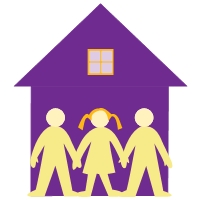Child Sexual Abuse
Parents Guide
Many children do not understand that what is happening is sexual or wrong. Most offenders know that if they physically harm a child while molesting them, the child is more likely to tell. They are also clever enough to make the child feel as if they are equally responsible for the contact.
Children become trapped and are unable to tell anyone what is happening. Given the way child molesters operate, it is imperative that adults become educated about child abuse, supervise their children more closely and take action if they suspect someone of abusing a child.
What is Sexual Abuse?
Child sexual abuse can include exposing, fondling, masturbation, oral sex, intercourse, and pornography.
Child molestation usually begins with a sex offender gaining a child’s trust and friendship.
The offender begins “testing” the child’s ability to protect themselves by telling sexual jokes, engaging in horseplay, back rubs, kissing or sexual games.
If the child appears comfortable with or curious about this type of behavior, (most healthy, normal children are) the offender will slowly increase the amount and type of touching to include more direct sexual touching.
TALKING TO YOUR CHILDREN ABOUT SEXUAL ABUSE
Talk openly with your children about sexual development, behavior and abuse.
Tell your children that, if anyone: touches or tries to see their private parts, tries to get them to touch or look at another person's private parts, shows them pictures of or tries to take pictures of their private parts, talks to them about sex, walks in on them in the bathroom or does anything that makes them feel uncomfortable to Tell you or a "support person" as soon as they can or the next time they see you.
Tell your children that , some children and adults have "touching problems". These people can make "secret touching" look accidental and they should still tell you even if they think it was an accident.
Tell your children that touching problems are kind of like stealing or lying and that the people who have those kinds of problems need special help so they don't continue to have problems or get in trouble. Don't describe it as a "sickness".
Tell your children that some people try to trick kids into keeping the touching a secret. Tell your children that "we don't want those kinds of secrets in our family".
Give your children examples of things that someone might use to try to get them to keep a secret: candy, money, special privileges, threats, subtle fear of loss, separation or punishment etc.
Tell your children that touching other people's private parts is not ok for children to do or for adults to do with children. Tell them that you do not want them to do "secret touching" with other people but that you will not be mad at them if they do come and Tell you it has happened. Even if it has been happening a lot.
Talk to your children about safety issues at least twice a year. Develop a family plan for answering the phone, fire safety, getting lost and "secret touching". Play "what if" games with them in the car on a regular basis (monthly).
Make sure they have support people they can talk to at home, at school, in their extended family, neighborhood or church. Have them pick out three people and tell you who they are. Put the phone numbers next to your phone and let them know that, if for any reason , they cannot talk to you - that they should call/or go see another support person.
WHAT TO DO IF YOUR CHILD GETS ABUSED
If your child tells you that he or she has been touched inappropriately, stay calm. Your reaction may make your child feel more guilty or afraid and they might have a harder time talking about what happened.
Tell your child you are glad they told you about it. Telling was a good way to take care of themselves and also, the person who touched them. That person needs help with their "touching problem". Tell your child that you will take care of things. Tell your child that you will need TO talk to someone to figure out what to do next. Be careful to not make promises you can't keep.
Seek support and comfort for yourself where the child can't see or hear what you say.
In order to avoid confusion, anxiety or guilt, children should not overhear conversations about their disclosure. Too much information/discussion can also interfere with the police investigation or prosecution.
Call your local child abuse hotline or local police department and report the abuse. Failing to report the abuse ASAP may mean that other children might get abused too. Don't try to handle the situation yourself.
Don't think you are helping a friend or relative by not reporting. Offenders rely on your good will and trust. They will tell you anything to avoid being reported.
The prognosis for healing after being molested is better for children who are supported and believed when they disclose.
Don't allow any further contact between the child and alleged offender. Don't confront the offender yourself.
copyright VOICES Of Involved Citizens Encouraging Safety Inc.
of VICTIMS, CHILDREN and COMMUNITY
VOICES
"No one wants to have to tell their children about sexual abuse. On the other hand, do you want your child to learn about it from a child molester?
Cory Jewell-Jensen
